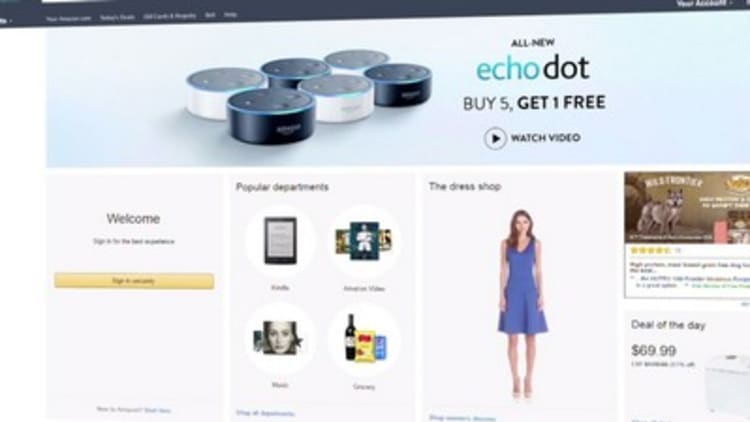
The surprise drop in is being blamed on Hurricane Harvey and
Retail sales fell 0.2 percent, but without autos, sales were actually up 0.2 percent in August. Some of the 1.6 percent decline in auto sales was blamed on Harvey.
But there was also a surprising dip in a category that rarely falls— online shopping. Nonstore retail sales, the bulk of which is internet shopping, fell 1.1 percent.
"One possible, at least logical, explanation is that the 1.8 percent rise in July non-store retail sales was boosted by the , so the apparent ensuing weakness is a return to a more normal sales activity post the Prime Day sales," wrote Ward McCarthy, chief financial economist at Jefferies. He notes that nonstore sales were up 8 percent year over year even with the sharp August decline.
Stephen Stanley, chief economist at Amherst Pierpont, also pointed to Amazon. He said details of July sales show that the sub category of internet shopping was up 2 percent, and probably the result of Amazon's self-proclaimed one-day shopping holiday.
Amazon has said its third annual Prime Day was its "biggest day ever," with sales surpassing its 2016 Black Friday and Cyber Monday results. Prime Day sales grew by more than 60 percent from 2016.
Stanley also blamed Harvey for the drop in auto sales, which took a dip at the end of the month. Harvey also could have been partly to blame for some of the jump in gasoline sales, which were up 2.5 percent. Stanley said prices were already slightly higher in August ahead of the hurricane, which dumped unprecedented rainfall on the heart of the refining industry.
Goldman Sachs economists, in a note, said Harvey likely added to sales declines in a number of discretionary categories—clothing, electronics and building materials.
Sales for September should also show the impact of Irma, which hit Florida on Sunday and caused the evacuation of coastal towns in Florida and other parts of the Southeast.
September could show more impact from storm preparations since residents had more time, ahead of Irma, which crashed through the Caribbean before slamming Florida. Harvey appeared fairly quickly, transforming rapidly from a tropical depression into a powerful hurricane.
"In my numbers, I took half a percent off of consumer spending in Q3 and added it back in to Q4," Stanley said. "I think that's broadly how I'm thinking about the hurricane effects. There will be ongoing impacts."


